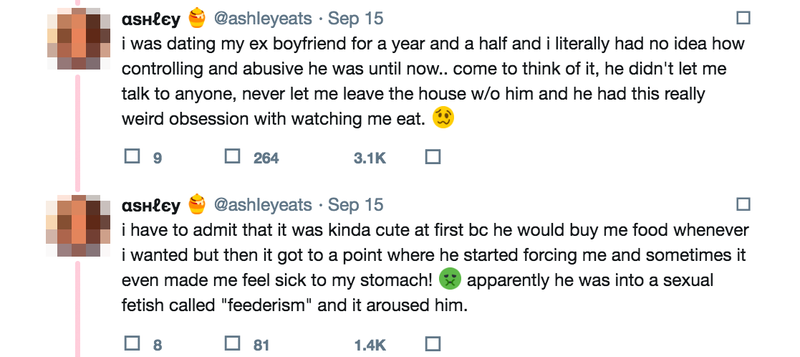Twitter recently went crazy over a disturbing story about a girl named “Ashley” who recounted, in a 32-tweet thread, a gruesome tale of abuse at the hands of her then-boyfriend. Ashley talks about how her boyfriend forced her to eat tons of food until she started getting stomachaches, an apparent sexual fetish that was then-unknown to her.
“he didn’t let me talk to anyone, never let me leave the house w/o him and he had this really weird obsession with watching me eat,” wrote Ashley.
“it got to a point where he started forcing me and sometimes it even made me feel sick to my stomach! apparently he was into a sexual fetish called ‘feederism’ and it aroused him.”
The story soon went viral, garnering over 300,000 likes and over 80,000 retweets. Unbeknownst to everyone, the story was completely and utterly fake.
Fake Story, Real Ad

As “Ashley” continued to talk about her abusive relationship, she recounts how she finally left her boyfriend and started trying to lose the fat she had gained. Inspired by stories about Josh Peck’s weight loss, she talks about how she tried everything to no avail.
Until, of course, she stumbles upon Sarah’s Discovery (also known as Sarah’s Program).
Sarah’s Discovery is described as being a magical pill that could burn fat and make you lose weight fast and safely. To prove her story, she posted ‘progress photos’ of herself. However, a quick Reverse Google Image search reveals that the photos are actually from an amateur model. The entire story was fabricated to sell Sarah’s Discovery, and for 300,000 people, they swallowed it hook line and sinker.
And unfortunately, she’s not alone: “Ashley” is just one of 30 twitter accounts masquerading as a dozen different women who would post stories about abuse in order to sell Sarah’s Discovery. What’s worse? People actually believe them, with these fake story threads regularly getting thousands of likes and retweets, with some even falling for the scam and actually ordering the pills, only to find out that they don’t work, or worse, that the pills give them allergic reactions that could have been lethal.
Going Viral for Cash

Aside from the compelling shady marketing scheme, what exactly made Sarah’s Discovery go viral?
Simple: cash.
A lot of the scam accounts are followed and retweeted by hugely popular content aggregate accounts. These secondary accounts have hundreds of thousands of followers. Even better, these aggregate accounts will boost your post to their followers for a small amount of cash. By running paid promotions, these accounts are able to monetize and make money out of simple reshares. Unfortunately, it’s a system that Sarah’s Discovery took advantage of, running paid promos through these aggregators to effectively create a viral campaign that is effective and far-reaching.
Although Twitter put in new guidelines to reduce the number of accounts that are spamming content. However, Sarah’s Discovery simply made new accounts and kept spamming.
Bringer of Fake News
In 2016, numerous fake news accounts started cropping up on Twitter, mostly to try and swing the tide of the U.S. elections one way or the other. When the elections ended, these fake news accounts migrated to the web, where they perpetuated fake news through their pages.
Soon enough, Sarah’s Discovery started making its way to these fake news sites, where they were marketed as “Keto Ultra Diet” or “Forskolin Miracle”. Much like Twitter’s aggregate accounts, fake news accounts will almost always boost and market other people’s posts for cash, and after 2016, these fake news sites had a huge following, not to mention reach, and most importantly, influence.

It was a brilliant marketing ploy that employed some of the best digital marketing tactics available: create interest on social media, make your product go viral, and then redirect them to websites that have more (false) information about the product.
In the same vein as Phen375 and Atkin’s Diet, Sarah’s Discovery was marketed as a safe and effective weight loss program that promised quick results. Unfortunately, it turned out to be a scam perpetrated using the best/worst aspects of social media.
As for Ashley? Well, we’re just happy that her stories weren’t real after all.



